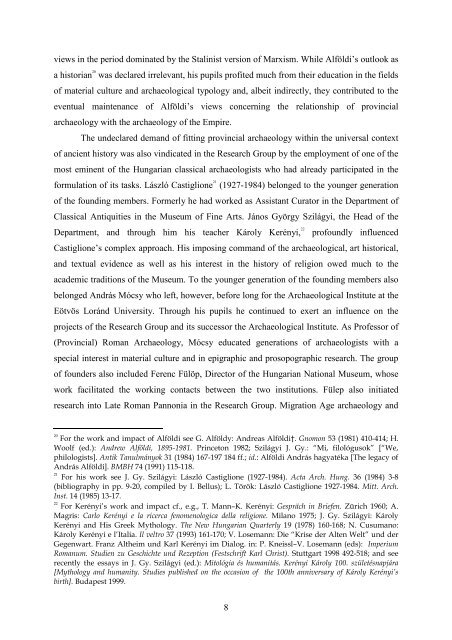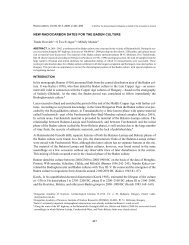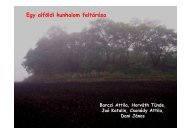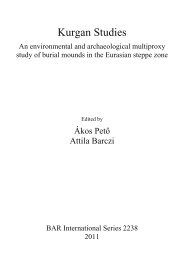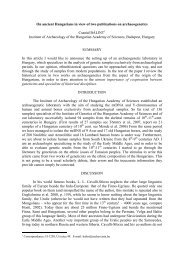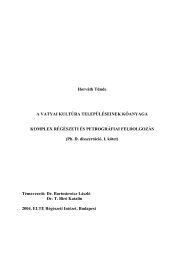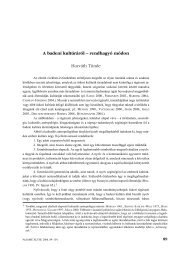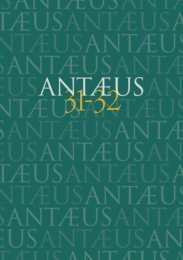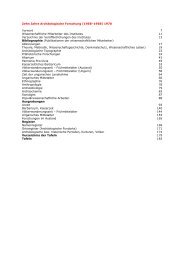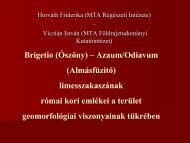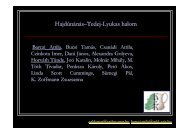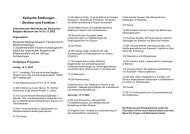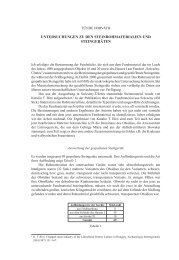The first forty-one years, 1958-19991 1. T - MTA Régészeti Intézet
The first forty-one years, 1958-19991 1. T - MTA Régészeti Intézet
The first forty-one years, 1958-19991 1. T - MTA Régészeti Intézet
Create successful ePaper yourself
Turn your PDF publications into a flip-book with our unique Google optimized e-Paper software.
views in the period dominated by the Stalinist version of Marxism. While Alföldi’s outlook as<br />
a historian 20 was declared irrelevant, his pupils profited much from their education in the fields<br />
of material culture and archaeological typology and, albeit indirectly, they contributed to the<br />
eventual maintenance of Alföldi’s views concerning the relationship of provincial<br />
archaeology with the archaeology of the Empire.<br />
<strong>The</strong> undeclared demand of fitting provincial archaeology within the universal context<br />
of ancient history was also vindicated in the Research Group by the employment of <strong>one</strong> of the<br />
most eminent of the Hungarian classical archaeologists who had already participated in the<br />
formulation of its tasks. László Castigli<strong>one</strong> 21 (1927-1984) belonged to the younger generation<br />
of the founding members. Formerly he had worked as Assistant Curator in the Department of<br />
Classical Antiquities in the Museum of Fine Arts. János György Szilágyi, the Head of the<br />
Department, and through him his teacher Károly Kerényi, 22<br />
profoundly influenced<br />
Castigli<strong>one</strong>’s complex approach. His imposing command of the archaeological, art historical,<br />
and textual evidence as well as his interest in the history of religion owed much to the<br />
academic traditions of the Museum. To the younger generation of the founding members also<br />
belonged András Mócsy who left, however, before long for the Archaeological Institute at the<br />
Eötvös Loránd University. Through his pupils he continued to exert an influence on the<br />
projects of the Research Group and its successor the Archaeological Institute. As Professor of<br />
(Provincial) Roman Archaeology, Mócsy educated generations of archaeologists with a<br />
special interest in material culture and in epigraphic and prosopographic research. <strong>The</strong> group<br />
of founders also included Ferenc Fülöp, Director of the Hungarian National Museum, whose<br />
work facilitated the working contacts between the two institutions. Fülep also initiated<br />
research into Late Roman Pannonia in the Research Group. Migration Age archaeology and<br />
20<br />
For the work and impact of Alföldi see G. Alföldy: Andreas Alföldi†. Gnomon 53 (1981) 410-414; H.<br />
Woolf (ed.): Andrew Alföldi, 1895-198<strong>1.</strong> Princeton 1982; Szilágyi J. Gy.: “Mi, filológusok” [“We,<br />
philologists]. Antik Tanulmányok 31 (1984) 167-197 184 ff.; id.: Alföldi András hagyatéka [<strong>The</strong> legacy of<br />
András Alföldi]. BMBH 74 (1991) 115-118.<br />
21<br />
For his work see J. Gy. Szilágyi: László Castigli<strong>one</strong> (1927-1984). Acta Arch. Hung. 36 (1984) 3-8<br />
(bibliography in pp. 9-20, compiled by I. Bellus); L. Török: László Castigli<strong>one</strong> 1927-1984. Mitt. Arch.<br />
Inst. 14 (1985) 13-17.<br />
22<br />
For Kerényi’s work and impact cf., e.g., T. Mann–K. Kerényi: Gespräch in Briefen. Zürich 1960; A.<br />
Magris: Carlo Kerényi e la ricerca fenomenologica della religi<strong>one</strong>. Milano 1975; J. Gy. Szilágyi: Károly<br />
Kerényi and His Greek Mythology. <strong>The</strong> New Hungarian Quarterly 19 (1978) 160-168; N. Cusumano:<br />
Károly Kerényi e l’Italia. Il veltro 37 (1993) 161-170; V. Losemann: Die “Krise der Alten Welt” und der<br />
Gegenwart. Franz Altheim und Karl Kerényi im Dialog. in: P. Kneissl–V. Losemann (eds): Imperium<br />
Romanum. Studien zu Geschichte und Rezeption (Festschrift Karl Christ). Stuttgart 1998 492-518; and see<br />
recently the essays in J. Gy. Szilágyi (ed.): Mitológia és humanitás. Kerényi Károly 100. születésnapjára<br />
[Mythology and humanity. Studies published on the occasion of the 100th anniversary of Károly Kerényi’s<br />
birth]. Budapest 1999.<br />
8


